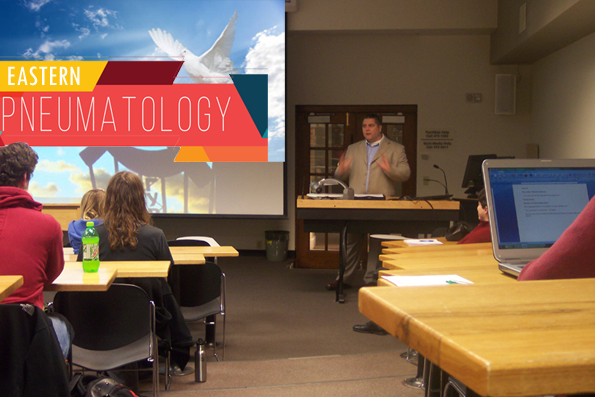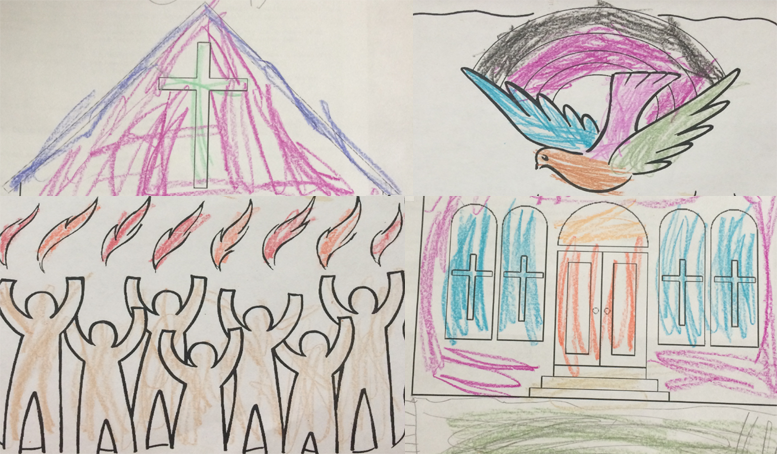13 Titles and Resources at Flower Pentecostal Heritage Center
June 30, 2022 by Cup&Cross
Filed under Featured, News, Publication, Research

Bulgaria once again on the verge of early elections
After the first successful vote of no confidence in Bulgarian history has become a reality, the county is now governed by a cabinet in resignation and a parliament torn apart by inter-party attacks. The National Assembly and the government can remain operational but attention must be paid to temporary majorities formed in plenary hall. However, adopting the budget update with its anti-inflation measures, which a large part of the Bulgarian population depends on, is in question, political analysts warn.
The vote is now over, but many questions remain unanswered.
“None of us who often commented on the objective difficulties, the contradictions in the coalition and the clash with the opposition could imagine that this government would be toppled so easily and so quickly,” sociologist Boryana Dimitrova, head of Alpha Research, said in an interview with BNR. “The economic stalemate, inflation and tense geopolitical state of affairs have led to a situation when no one is particularly eager to take power. Analysts have already pointed out that the lack of a political force that feels ready to take power prolongs the life of this government.”
After the cabinet was brought down, it turned out that solving the political puzzle is not so easy. The inability of the National Assembly to make decisions after the withdrawal of one of the coalition partners – “There is Such a People” is more than obvious and this will lead to early elections, analysts say.
Despite the difficult situation, Prime Minister Kiril Petkov said that “We Continue the Change” party, which is the largest political force in parliament, would accept the mandate of President Rumen Radev to form a government and would try to find 121 independent MPs. However, Deputy Prime Minister Assen Vassilev is pessimistic and forecasts that the country is heading towards new elections in the autumn.
“Seeking support from several MPs while it is unknown what mechanism can be used for them to join in and how sustainable their vote would be is either a tale for naive people or a dangerous political delusion,” Boryana Dimitrova says.
In this situation, the speed with which the parliamentary roulette will be turned is important. This depends on the Bulgarian President and there are constitutional deadlines, but the process can be faster or slower enough to update the budget – an extremely serious topic for many Bulgarians. The update envisages pension hike from 1 July, tax cuts for working families with children, support for the business to deal with high energy prices. Minister of Social Affairs Georgi Gyokov called on MPs to “show some common sense” and to support the social and anti-inflationary measures specified in the update.
“There is a lot of appetite towards the budget and discussions are heated,” sociologist Boryana Dimitrova says. “On the one hand we are told that various demands can be met, while others claim that this is a time bomb that would explode next year. It is difficult to find the truth, but in any case we need a serious conversation and a purposeful budget update. Whether this will happen and what proposals will be made between the first and second reading of the document in the National Assembly is an important political question that will give us signals whether we can think about future coalitions or overlap of opinions at least when it comes to basic economic principles.“
Government Elections in Bulgaria (2005-2022):
2005 Parliamentary Elections
2006 Presidential Elections
2007 Municipal Elections
2009 Parliamentary Elections
2009 European Parliament elections
2011 Presidential Elections
2011 Local Elections
2013 Early parliamentary elections
2014 Early Parliamentary Elections
2015 Municipal Elections
2016 Presidential election
2017 Parliamentary elections
2019 European Parliament election (23-26 May)
2019 Bulgarian local elections
2019 Municipal Elections
2021 March National Parliament election
2021 Second National Parliament election
2021 Third National Parliament and Presidential elections
The White House announces new US ambassador to Bulgaria
US President Joe Biden has nominated Kenneth Merten for new ambassador to Bulgaria in place of Herro Mustafa, who has been ambassador to Sofia since 2019. The nomination must be approved by the Senate in Washington. Kenneth Merten has acted as Special Coordinator for Haiti and he was also Ambassador to Croatia from 2012 to 2015 and Ambassador to Haiti from 2009 to 2012. Merton was also an economic adviser at the US Embassy in France. He speaks Haitian Creole, French, German and Spanish languages.
The East Syrian (Assyrian) Church

Dony K. Donev, D.Min.: Eastern Pneumotology Lectures
Eastern Orthodoxy can be expressed in one word: theism. The purpose and meaning of life is to become more like God. Deification is pursued by all means of human existence. This quest for divine likeness often includes the typical for the Eastern Church, speculation on the divinity and humanity of Christ, traditions on the doctrine of the Trinity and non-traditional mystical experiences. They appear in the context of both physical and spiritual characteristics in individual and corporate ecclesiastical environment. The role of the Spirit in the process of deification is threefold and involves: creation, re-creation and theism. Eastern Pneumotology follows the graduate process of theism development. The Spirit is involved in the original creation of the world as well as the new-birth experience. His work however, does not end there, but continues throughout the process of personal deification of the believer.
The East Syrian (Assyrian) Church
The Assyrian Church is viewed in direct connection with the Jacobites.[1] The church grows in the context of Nestorianism and Assyrian practices.[2] Yet, the literature of the Assyrian Church is full of pneumatologay including symbolic language and profound spirituality.[3] For example, Narsai’s (413-ca. 503) pneumatology is strictly in the boundaries of liturgical and sacramental practices. An immediate contrast, however, is Isaac of Nineveh (7th c.), who, during sacraments, would suddenly fall on the floor, repeatingly rising up and kissing the cross.[4]
For Narsai the Spirit sanctifies and edifies the church through baptism.[5] In a similar manner, Hazzaya (d. ca 690), another Assyrian writer, views the Holy Spirit not only as Edifier, but also as Perfector of the Church.[6] As such, He brings transformation in the life of the believer.[7] This state is reached with beyond the conscious prayer.[8] It is accompanied with sweet odors,[9] tears of joy[10] and sound of glorification heard in the soul of the individual.[11] This description fits the previously discussed experience of Symeon the New Theologian.[12] Isaac of Nineveh also describes the ecstasy in the Spirit in the means of tears of joy[13] and “a state of drunkenness.”[14]
The above is strictly a personal experience.[15] In a corporate, ecclesiastical context, the union of individual experiences builds the Kingdom of God. In this sense the Kingdom is an already-not-yet reality, in which the direction of the Holy Spirit is essential. [16]
The gifts are essential for the life of the Kingdom. According to Narsai, the they are received through laying on of hands.[17] Healing is obtained through a similar ritual.[18] Isaac claims that they are bestowed in a time of prayer.[19] They are accepted in humility out of which comes as burning compassion for the creation.[20]
Hazzaya, furthermore, gives five practical signs for recognition of the works of the Holy Spirit: (1) love of God burns within the heart of the believer, (2) growth in humility of the soul, (3) kindness to all people, (4) true love and (5) vision of mind. His main tool to recognize demons and demonic visions from God and divine revelations is the peace of heart, which follows the heavenly presence.[21]
Peace can be also reached through reading of Scripture. According to Isaac of Nineveh, Scripture delivers us from every evil thought and turns our minds to good.[22] Scripture is to be read not by chapters, but a passage at a time with prayerful desire for understanding.[23] This is one of the first recorded attempts explaining the connection between pneumatic experiences and Scripture.
[1] Burgess, 85.
[2] Ibid., 88.
[3] Ibid., 89.
[4] A. J. Wensinck, Mystical treatises of Isaac of Nineveh, trans. From the Bedjan Syrian text (Amsterdam: Koninklijke akademie van wetenschappen, 1923), 95-96.
[5] R. Hugh Connolly, The Liturgical Homiletics of Narsai, Studies and Texts 8 (Cambridge: University Press, 1909), 46, 49-50.
[6] Alphonsi Mingana, “Joseph Hazzaya: The Shortest Path that Leads us to God,” Early Christian Mystics, Woodbroke Studies 7 (Cambridge: W. Heffer and Sons, 1934), 148.
[7] Ibid.,149.
[8] Ibid., 171.
[9] Ibid., 148-49.
[10] Ibid., 183.
[11] Ibid., 183.
[12] Disc. 3329.5, 313.
[13] Wensinck, 330.
[14] Ibid., 253.
[15] Mingana, 157.
[16] Ibid.
[17] Connolly, 8, 21, 34, 40, 49, 53, 63.
[18] Ibid., 35, 44.
[19] Wensinck, xxxix, 116-17.
[20] Ibid., 388.
[21] Mingana, 173-74.
[22] E. Kadloukovsky and G. E. H. Palmer, Early Father from the Philokalia (London: Faber and Faber, 1954), 242.
[23] Wensink, 84.
It’s all about them
If a leader doesn’t understand the concept of “service above self” they will not engender the trust, confidence, and loyalty of those they lead. Any leader is only as good as his or her team’s desire to be led by them. An over abundance of ego, pride, and arrogance are not positive leadership traits. Real leaders take the blame and give the credit – not the other way around. Long story short; if a leader receives a vote of non-confidence from their subordinates…game over.
Spiritual Fullness (Fullness in the Spirit) among Early Bulgarian Pentecostals and Today

Bulgaria’s early Pentecostals insisted on a spiritual fullness that included: (1) salvation, (2) water baptism and (3) baptism with the Spirit.[1] As a formula of spiritual experience, it satisfied the witness of blood, water and Spirit (1 Jn. 5:8) on earth; but also corresponded with the triune God in heaven (1 Jn. 5:7), from whom the believer’s spiritual experience originated. Many conservative Pentecostals in Bulgaria today still uphold “the fullness” teaching and would not use Bibles that exclude Johannine Comma (1 John 5:7) for these three “bear record in heaven.”[2]
However, even with the already present Trinitarian experience of the believer and the enormous theological Methodist influence, it is astounding that the doctrine of sanctification was not taught as a separate work of grace among Bulgarian Protestants. Even when after Pentecostalism spread in Bulgaria, it was not included in the tri-fold formula for “spiritual fullness” of the believer. During the persecution of the Communist Regime, speaking in tongues during Communion was done as a spiritual confirmation that the person has “fullness in the Spirit” or is not a government agent sent by the police to spy on the rest of the church. Interpretation often followed to confirm the spiritual stand of the believer. Early Bulgarian Pentecostals did not distinguish between the initial evidence and the gift of speaking in tongues. Even communist propaganda author Boncho Assenov, who categorized Pentecostals as a sectarian cult, defined this fullness as fundamental for the sacramental theology of the early charismatic communities in Bulgaria.[3]
[1] Mollov, 209.
[2] Zarev, 28.
[3] Boncho Asenov, Religiite i sektite v Bŭlgariia (Sofia: Partizdat, 1968), 167, 367.
See also:
The Practice of Corporate Holiness within the Communion Service of Bulgarian Pentecostals
Sanctification and Personal Holiness among Early Bulgarian Pentecostals
Water Baptism among early Bulgarian Pentecostals
First Pentecostal Missionaries to Bulgaria (1920)
Rapid Decline of Holy Spirit Baptisms (Research Study)
This study was first published by Cup & Cross Ministries International on March 1, 2018
Information Regarding the Questionnaire and the Church of God Statistics
The survey was developed by Dr. G. D. Voorhis in 2005 with the hope that it might contribute in some small way to ascertain certain trends which appear to be developing in the Church of God (headquarters in Cleveland, Tennessee). The primary emphasis was on the baptism of the Holy Spirit, according to Acts 2:4, with the initial evidence of speaking with other tongues as the Spirit gives the utterance.
One might think that the charismatic movement of the 1960’s and 1970’s, with its effect on mainline interdenominational churches, would bring an upsurge in traditional Pentecostal churches as individuals experienced this infilling of the Spirit, but this was not so in the Church of God. This survey, with the confounding variables it might contain, along with statistics supplied by the General Headquarters of the Church of God, proves without a reasonable doubt that the Church of God is rapidly becoming a non-Pentecostal organization.
The statistics alone, supplied by General Headquarters, show that during the period of Sept., 2003 to August, 2004, we had 266,419 conversions, but only 60,926 that were baptized with the Holy Ghost. This downward trend in Holy Ghost baptisms has been continuing since 1960 (which was as far back as we could go in computerized records), up until the present time. In fact, the 2003-2004 statistics compute to a 23% decline in the Holy Ghost baptisms in this one year alone….
Going back to Portrait and Prospects, [Dr. J. D. Bowers, Ph.D., editor] the only survey ever authorized in the history of the Church of God (and I think one of the best things of this type ever coming from Headquarters), Mitchell W. Flora, D.Min., stated on page 35, “Also, while elements of Pentecostal spirituality may be present, the survey does not reveal the regularity of these occurrences, nor does it reveal the extent of these practices. The real question is how many of those who attend our churches are sanctified or filled with the Spirit.”
In the same writing, “Dr. John Maxwell’s assessment that our denomination is prone to the rigors of a slow death,” we again quote page 80: “Church of God ministers, with which of the following are you very satisfied? Spiritual life: 42% of the Church of God answered ‘yes’, but 68% of other Pentecostals reported ‘yes’.”
Well under half of our ministers are paying the price of prayer, fasting, and devotion to the Word of God to feel satisfied with their spiritual life. We are outdone by other Pentecostals by 26%. Another quote we should mention is on page 88: “Innovative pastors and others desiring to change to achieve greater effectiveness exhibit a tendency to disconnect ministry development and practice from their Pentecostal identity and faith”….
Based on this, and on the statistics from the Church of God General Headquarters in Cleveland, Tennessee, as well as the computations that were done from the surveys by Gary Anderson (an engineer in computer and mathematics, as well as a member of Central Church of God), who put in countless hours perfecting the statistics as much as possible from the data available, I must concede that the Church of God, based in Cleveland, Tennessee, is rapidly becoming a non-Pentecostal organization. All that can change this trend is a miracle of God such as the Cane Ridge Camp Meeting or the Azusa Street Mission. We need a last-day revival, accompanied by a great outpouring such as happened at Pentecost in the book of Acts.
If I read my Bible correctly, this is not promised universally; however, this does not keep churches from paying the price in prayer and consecration to experience local revivals and enjoy great Pentecostal experiences, in spite of the last days before the coming of our Lord to rapture His church and send His judgments on this wicked, sinful earth. “Even so, come Lord Jesus.”
Within Holy Ghost Baptisms:
Within 44 years, Holy Ghost baptisms grew by 54.22%, with an average annual growth rate of 0.98950%, less than 1%. The ratio between church members and NEW HOLY GHOST BAPTISMS DROPPED 17.6% to 6.1% currently. Currently, only 6% of our members have the Holy Ghost baptism. (Dr. G. D. Voorhis, Experiences in Pentecost: 33 A.D. – 2005 A.D., p.311-16)
I myself have preached the Pentecostal Way of Salvation since age 16. I will soon be 50 years old with over 30 years invested in ministry with the Church of God. You have probably invested even more. I didn’t respond to the Heavenly Call to put all this work into the Kingdom, only to find out 30 years later that 90% of our church folk don’t even know who the Holy Spirit is. We simply cannot claim, as a movement and as a church, that we are Pentecostal if most of our members have never experienced His Baptism with tongues and fire.
For this reason, I am re-committing myself and ministry to revival and restoration of the Pentecostal Message through praying, fasting and preaching:
- salvation of the sinner’s soul and entire sanctification through the Blood of Jesus
- baptism with the Holy Spirit and fire with initial evidence of speaking in tongues
- supernatural gifts and ministries of the Holy Spirit
- healings, deliverance and signs following
- pre-Millennial return of Christ and pre-Tribulation Rapture of His Church to glory.
As I was considering how to end this already long letter, I came across the following statement one of my students made in a final paper:
“I hope this is a section where I am allowed to be real. Here I would like to answer the question, ‘How will the study of the Book of Acts change the way that you think or live as a Christian?’ I write this with tears in my eyes because I don’t know how to be filled with the Spirit in such a way as Steven or Paul. I’m sitting at my desk wondering how I can become so filled with the Spirit that I am not only willing to die for my faith, but that I can do so with the peace that Stephen had?”
Please consider the URGENCY of this generation!
- Call us and let us reason and plan what we can do together to change this rapid decline.
- Revival will not come without preaching!
- Revival of Pentecost will not come without preaching the Message of Pentecost.
For the Kingdom,
Rev. Dony K. Donev, D. Min.








